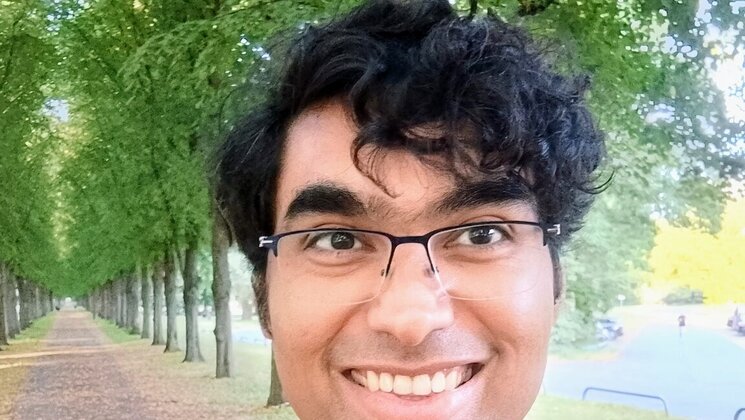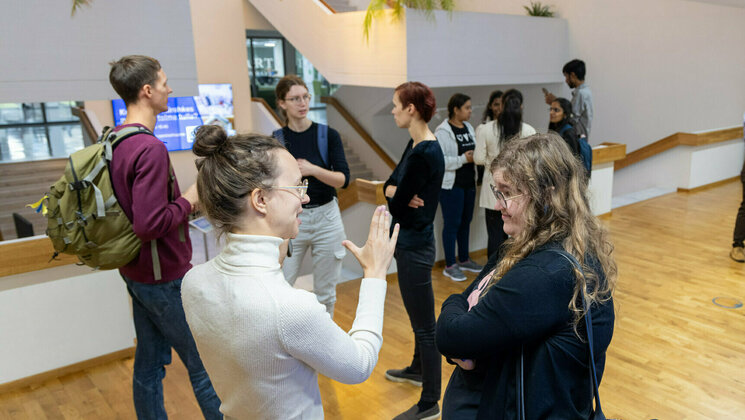-
Faculty of Arts and HumanitiesDean's Office, Faculty of Arts and HumanitiesJakobi 2 ruumid 116–121, 51005 Tartu linn, EST0Institute of History and ArchaeologyJakobi 2 51005 Tartu linn, Tartu linn, Tartumaa EST0Institute of Estonian and General LinguisticsJakobi 2, IV korrus 51005 Tartu linn, Tartu linn, Tartumaa EST0Institute of Philosophy and SemioticsJakobi 2, III korrus, ruumid 302-337 51005 Tartu linn, Tartu linn, Tartumaa EST0Institute of Cultural ResearchÜlikooli 16 51003 Tartu linn, Tartu linn, Tartumaa EST0Institute of Foreign Languages and CulturesLossi 3 51003 Tartu linn, Tartu linn, Tartumaa EST0School of Theology and Religious StudiesÜlikooli 18 50090 Tartu linn, Tartu linn, Tartumaa EST0Viljandi Culture AcademyPosti 1 71004 Viljandi linn, Viljandimaa EST0Professors emeriti, Faculty of Arts and Humanities0Associate Professors emeriti, Faculty of Arts and Humanities0Faculty of Social SciencesDean's Office, Faculty of Social SciencesLossi 36 51003 Tartu linn, Tartu linn, Tartumaa EST0Institute of EducationJakobi 5 51005 Tartu linn, Tartu linn, Tartumaa EST0Johan Skytte Institute of Political StudiesLossi 36, ruum 301 51003 Tartu linn, Tartu linn, Tartumaa EST0School of Economics and Business AdministrationNarva mnt 18 51009 Tartu linn, Tartu linn, Tartumaa EST0Institute of PsychologyNäituse 2 50409 Tartu linn, Tartu linn, Tartumaa EST0School of LawNäituse 20 - 324 50409 Tartu linn, Tartu linn, Tartumaa EST0Institute of Social StudiesLossi 36 51003 Tartu linn, Tartu linn, Tartumaa EST0Narva CollegeRaekoja plats 2 20307 Narva linn, Ida-Virumaa EST0Pärnu CollegeRingi 35 80012 Pärnu linn, Pärnu linn, Pärnumaa EST0Professors emeriti, Faculty of Social Sciences0Associate Professors emeriti, Faculty of Social Sciences0Faculty of MedicineDean's Office, Faculty of MedicineRavila 19 50411 Tartu linn, Tartu linn, Tartumaa ESTInstitute of Biomedicine and Translational MedicineBiomeedikum, Ravila 19 50411 Tartu linn, Tartu linn, Tartumaa ESTInstitute of PharmacyNooruse 1 50411 Tartu linn, Tartu linn, Tartumaa ESTInstitute of DentistryL. Puusepa 1a 50406 Tartu linn, Tartu linn, Tartumaa ESTInstitute of Clinical MedicineL. Puusepa 8 50406 Tartu linn, Tartu linn, Tartumaa ESTInstitute of Family Medicine and Public HealthRavila 19 50411 Tartu linn, Tartu linn, Tartumaa ESTInstitute of Sport Sciences and PhysiotherapyUjula 4 51008 Tartu linn, Tartu linn, Tartumaa ESTProfessors emeriti, Faculty of Medicine0Associate Professors emeriti, Faculty of Medicine0Faculty of Science and TechnologyDean's Office, Faculty of Science and TechnologyVanemuise 46 - 208 51003 Tartu linn, Tartu linn, Tartumaa ESTInstitute of Computer ScienceNarva mnt 18 51009 Tartu linn, Tartu linn, Tartumaa ESTInstitute of GenomicsRiia 23b/2 51010 Tartu linn, Tartu linn, Tartumaa ESTEstonian Marine Institute0Institute of PhysicsInstitute of ChemistryRavila 14a 50411 Tartu linn, Tartu linn, Tartumaa EST0Institute of Mathematics and StatisticsNarva mnt 18 51009 Tartu linn, Tartu linn, Tartumaa EST0Institute of Molecular and Cell BiologyRiia 23, 23b - 134 51010 Tartu linn, Tartu linn, Tartumaa ESTTartu ObservatoryObservatooriumi 1 61602 Tõravere alevik, Nõo vald, Tartumaa EST0Institute of TechnologyNooruse 1 50411 Tartu linn, Tartu linn, Tartumaa ESTInstitute of Ecology and Earth SciencesJ. Liivi tn 2 50409 Tartu linn, Tartu linn, Tartumaa ESTProfessors emeriti, Faculty of Science and Technology0Associate Professors emeriti, Faculty of Science and Technology0Institute of BioengineeringArea of Academic SecretaryHuman Resources OfficeUppsala 6, Lossi 36 51003 Tartu linn, Tartu linn, Tartumaa EST0Area of Head of FinanceFinance Office0Area of Director of AdministrationInformation Technology Office0Administrative OfficeÜlikooli 17 (III korrus) 51005 Tartu linn, Tartu linn, Tartumaa EST0Estates Office0Marketing and Communication OfficeÜlikooli 18, ruumid 102, 104, 209, 210 50090 Tartu linn, Tartu linn, Tartumaa EST0Area of Vice Rector for ResearchUniversity of Tartu LibraryW. Struve 1 50091 Tartu linn, Tartu linn, Tartumaa EST0Grant OfficeArea of Vice Rector for DevelopmentCentre for Entrepreneurship and InnovationNarva mnt 18 51009 Tartu linn, Tartu linn, Tartumaa EST0University of Tartu Natural History Museum and Botanical GardenVanemuise 46 51003 Tartu linn, Tartu linn, Tartumaa EST0International Cooperation and Protocol Office0University of Tartu MuseumLossi 25 51003 Tartu linn, Tartu linn, Tartumaa EST0Area of RectorRector's Strategy OfficeInternal Audit OfficeArea of Vice Rector for Academic AffairsOffice of Academic AffairsUniversity of Tartu Youth AcademyUppsala 10 51003 Tartu linn, Tartu linn, Tartumaa EST0Student Union OfficeÜlikooli 18b 51005 Tartu linn, Tartu linn, Tartumaa EST0Centre for Learning and Teaching
University of Tartu received €30 million to develop a centre of excellence for personalised medicine

Over the next six years, a consortium led by the University of Tartu and Tartu University Hospital will establish a personalised medicine research and development centre of international excellence in Estonia. The project is supported by the European Commission with €15 million, with the Estonian state investing the same amount.
According to Mait Metspalu, Professor of Evolutionary Genomics at the University of Tartu, the data of the Estonian Biobank has allowed making important scientific discoveries about the links between genes and health, yet we are still several steps away from implementing genetics-based health services. This will require closer collaboration between different research disciplines, from clinical medicine and public health to social and data sciences. "Since its establishment, the Estonian Biobank has aimed to advance Estonian healthcare by developing personalised medicine. The investment received for the centre is an acknowledgement to the university for years of research and infrastructure development on the one hand, and to the Estonian state for building digital databases, services and legal framework enabling the development of personalised medicine on the other," Metspalu said.
The creation of the region's most powerful centre of expertise will allow studying all stages of implementing personalised medicine through collaboration between different scientific disciplines. "While the main role of the University of Tartu is to develop scientific methods and new data tools, Tartu University Hospital will conduct clinical trials to study and validate applications developed by research partners in collaboration with patients," said Sander Pajusalu, Head of the Genetics and Personalized Medicine Clinic at Tartu University Hospital. In addition to clinical trials, it is also important to assess the impact of personalised medicine services on society, the economy and public health.
During the project, the consortium aims to make people's health data in Estonia more digitally usable, fostering innovation in healthcare. Jaak Vilo, Professor of Bioinformatics at the University of Tartu, considers Estonia a pioneer in creating an electronic health records system, yet some of the data is still unstructured and in free-text format. "We need a data sharing and analysis system that can be used for research, but also for creating personalised medicine tools and clinical guidelines. In this way, we will enable better use of electronic health records for research and treatment alike," added Vilo. A well-organised health data infrastructure and Estonia's strong start-up environment will boost health technology startups, which in turn will accelerate the flow of research into society.

Since its establishment, the Estonian Biobank has aimed to advance Estonian healthcare by developing personalised medicine. The investment received for the centre is an acknowledgement to the university for years of research and infrastructure development on the one hand, and to the Estonian state for building digital databases, services and legal framework enabling the development of personalised medicine on the other.
One of the project's objectives is to sequence the full genome of 10,000 Estonian residents, which is necessary to provide personalised medicine services to the entire Estonian population. Previous research projects have focused on testing personalised medicine tools on a smaller population with a more homogeneous genetic background. "We need to sequence more full genomes to broaden our reach and include genetic information from Estonian residents of diverse backgrounds," said Metspalu. The diverse dataset will also support the European Union's 1+ Million Genomes initiative, which will boost innovation in healthcare across Europe.
The R&D activities at the centre involve the Institute of Genomics, the Institute of Computer Science, the Institute of Clinical Medicine, the Institute of Family Medicine and Public Health, and the Johan Skytte Institute of Political Studies of the University of Tartu. External partners are the University of Helsinki and the Erasmus University Medical Centre in Rotterdam, the best institutions developing personalised medicine in Europe. Partners can share experiences and engage in closer cooperation to move personalised medicine forward.
Teaming for Excellence is a funding action under Horizon Europe, the EU Framework Programme for Research and Innovation, which supports cooperation between European research institutions to improve research and innovation capacity and increase the competitiveness of the region's economy. The project will start in 2023 and run for six years.
Read more similar news






